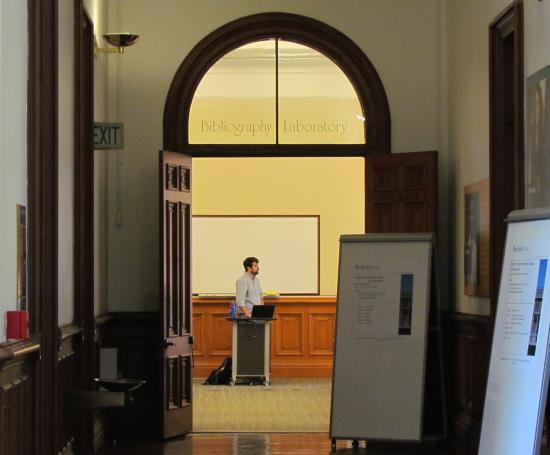Ph.D. Research Reception
Join us as Ph.D. students from the School of Information share their innovative research with the community.
The Ph.D. program at the School of Information draws doctoral students from a wide array of disciplines whose interests and approaches are as varied as their backgrounds. Though they all take technology as their object of study, our Ph.D. students approach the topic from many different angles — economic, political, social, legal, ethical — in an effort to understand the present impact and future development of information technology.
Each doctoral student will share their research in a 10-minute presentation, with an additional 3 minutes for questions. The presentations will be followed by a poster session and reception.
Schedule
| 4:10 – 4:15 pm | Opening Remarks Ph.D. Head Graduate Advisor Coye Cheshire |
| 4:15 – 4:30 pm | Finding the Local in Locations: Working with GPS Non-Use in Nairobi Elizabeth Resor |
| 4:30 – 4:45 pm | Random, Messy, Funny, Raw: Finstas as Intimate Reconfigurations of Social Media Sijia Xiao |
| 4:45 – 5:00 pm | Modeling Sociolects on Reddit Lucy Li |
| 5:00 – 5:15 pm | Handoff, Academic Infrastructure, and Google Scholar Daniel Griffin |
| 5:15 – 5:30 pm | Chasing Data: Tensions of Teaching in Virtual Schools Anne Jonas |
| 5:30 – 5:50 pm | Break |
| 5:50 – 6:05 pm | Values by Design Imaginaries: Investigating Values Work in UX Practice Richmond Wong |
| 6:05 – 6:20 pm | Music Performance Modeling Jon Gillick |
| 6:20 – 6:50 pm | Dissertation Talk: Migration and Social Networks: New Insights from Novel Data Guanghua Chi |
|
6:50 – 7:05 pm
|
Lightning Talks for Poster Session
|
| 7:05 – 8:00 pm | Reception and Poster Session |
Presentations
Each student will share their research in a ten-minute presentation, with an additional three minutes for questions.
Finding the Local in Locations: Working with GPS Non-Use in Nairobi
Elizabeth Resor
The Nairobi Accident Map crowdsourced traffic accident reports from Kenyan social media users. Because most users did not turn on GPS location services for their social media posts, or used devices without a GPS, we created a manual geocoding process that used pairs of landmarks and road names to identify places as they were colloquially described. In doing so, we centered the agency and local practices of Kenyan social media users and questioned the presumed “accuracy” of embedded GPS data and generalized definitions of urban space.
Random, Messy, Funny, Raw: Finstas as Intimate Reconfigurations of Social Media
Sijia Xiao
Among many young people, the creation of a finsta — a portmanteau of “fake” and “Instagram” which describes secondary Instagram accounts — provides an outlet to share emotional, low-quality, or indecorous content with their close friends. To study why people create and maintain finstas, we conducted a qualitative study through interviews with finsta users and content analysis of video bloggers exposing their finsta on YouTube. We found that one way that young people deal with mounting social pressures is by reconfiguring online platforms and changing their purposes, norms, expectations, and currencies. Carving out smaller spaces accessible only to close friends allows users the opportunity for a more unguarded, vulnerable, and unserious performance. Drawing on feminist theory, we term this process intimate reconfiguration. Through this reconfiguration, finsta users repurpose an existing and widely-used social platform to create opportunities for more meaningful and reciprocal forms of social support.
Modeling Sociolects on Reddit
Lucy Li
Online language expresses immense amounts of variation, which is often driven by social variables. There has been much attention on what words are used across these social groups, such as examining the frequency of types. However, there is also increasing interest in how words are used as well, or variation in meaning. Our work examines both, and operationalizes the study of the latter using recent advances in contextualized word embeddings, specifically BERT (Bidirectional Encoder Representations from Transformers). We present methods for quantifying how much the language of an online community deviates from the norm and measure behavioral attributes of communities that contain sociolect-like linguistic behavior.
Handoff, Academic Infrastructure, and Google Scholar
Daniel Griffin
An exploration of Google Scholar as an academic platform through the lenses of the handoff analytic model and the infrastructures literature.
Chasing Data: Tensions of Teaching in Virtual Schools
Anne Jonas
Education journalist Dana Goldstein has called teaching in public schools “America’s Most Embattled Profession.” Teachers are responsible for attending to learning, discipline, and social-emotional support, while facing competing pressures and accountability structures. How does such a complex and high-stakes role shift when placed within a digital context? Teachers find themselves physically removed from students, relieved of some disciplinary tasks and able to attain greater flexibility in their daily routine. Yet they may be simultaneously encountering more of their students’ domestic lives and sharing more of their own, as they negotiate educational responsibilities with students’ parents or guardians and often work within the context of their own homes. In navigating these digital arrangements, new vulnerabilities and opportunities emerge. As teachers learn to attend to behavioral data passively captured on their students’ activities, and to produce and share knowledge about students gleaned from their encounters, their own labor can become subject to tracking by both parents and administrators, with unpredictable consequences. Facing conflicting traditions and norms of organized public sector labor and the on-demand economy, teachers at virtual schools carve out a new way with the potential to spill over into brick and mortar environments. Drawing on qualitative interviews and ethnographic observations, this presentation, which is part of a larger dissertation study on stakeholder experiences with U.S. virtual schools at the k-12 level, analyzes the unique risks and rewards of teaching in a virtual school setting, finding that teachers adopt new strategies to manage emerging configurations of care, control, and organizing central to their work practice using the unique affordances of digital platforms.
Values by Design Imaginaries: Investigating Values Work in UX Practice
Richmond Wong
The desire to see technology companies address issues related to ethics and social values has been surfaced in new ways, in part due to external regulatory forces as well as internal labor forces. Understanding what these desires, practices, and initiatives look like from the perspective of technology practitioners can provide insight into how technologists work to conceptualize and address different values within their professional, technical, and institutional contexts. This presentation reports on two engagements with user experience (UX) professionals working at software companies in the San Francisco Bay Area: a series of interviews, and a design activity creating speculative scenarios related to technologists’ practices. These engagements seek to: gain insight into what work engineers and designers do in the name of values and ethics while navigating their organizations; exploring the tensions that exist in doing this work; and suggest alternative forms of work practice or organization that designers and engineers may desire. This presentation provides an investigation of ways in which practices to address ethics and values are already present in technical practices and corporate organizations, and the opportunities that those practices may both afford and foreclose for addressing ethics and values during the design process.
Music Performance Modeling
Jon Gillick
This talk discusses my work in progress on modeling music with machine learning. Motivated by the potential of new tools for creators, I’ll present some technical approaches for teaching computers about music, and then I’ll discuss the need for understanding the perspectives of musicians who contribute to machine learning datasets.
Dissertation Talk: Migration and Social Networks: New Insights from Novel Data
Guanghua Chi
Migrants play a central role in the economy and society of most developing countries and are primary drivers of economic mobility among poor and rural households. The decision to migrate is one of the most important economic decisions an individual can make. On the one hand, social networks play a crucial role in influencing people’s migration decision. On the other hand, as migrants adapt to a new environment, their social network evolves. My research seeks to shed light on the influence of social networks on migration, as well as the influence of migration on social networks. The dissertation will answer three questions on migration and social networks using large-scale social network data. (1) What are the roles of migrants in connecting global social networks? (2) How do social networks affect people’s decision to migrate? (3) How do migrants’ social networks evolve over the migration process?
Posters
Posters will be available during the reception and poster session.
Examining the Effects of Biosensory Information on Empathic Accuracy, Humanization, and Closeness
Max Curran
Humans have a basic need to understand and be understood, a pursuit that can be challenging in situations involving computer-mediated communication. Research in the domain of social biosensing suggests that sharing some of the innermost information about our bodies may aid in aspects of empathy and closeness central to this mutual understanding. In the present study we conducted an experiment in which we found that embedding a target person’s recorded electrodermal activity (EDA) into a video recorded from their first- person perspective experience in VR increased participants’ (N = 148) perceptions of interpersonal closeness with the target and of the target’s responsiveness, compared to a condition with no additional information. Furthermore, while narrative information from the target resulted in participants more accurately inferring the target’s most negative moments, EDA information was more helpful inferring when the target was most relaxed. We further contextualize our results via interviews with some of the participants who interpreted EDA. We conclude with recommendations for future directions to investigate the empathic role of biosensing in computer-mediated communication.
Covert Embodied Choice
Jeremy Gordon
Preliminary findings from a VR-based human behavioral study looking at how individuals respond to and attempt to evade predictive surveillance.
Lux: Towards Intelligent Visual Data Discovery
Doris Lee
Lux is a Python library that makes data science easier by automating certain aspects of the data exploration process. Lux is designed to facilitate faster experimentation with data, even when the user does not have a clear idea of what they are looking for. More information
If you require video captions for accessibility and this video does not have captions, click here to request video captioning.










